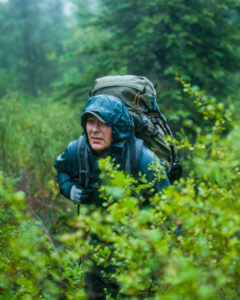Sam Alexander is a veteran of the U.S. Army who served as a Green Beret (Special Forces).
 After
returning home from the Army, he got a business degree to benefit his
native tribe, the Gwich’in. The Gwich’in are the northernmost Indian
Nation living in fifteen small villages scattered across a vast area
extending from northeast Alaska in the U.S. to the northern Yukon and
Northwest Territories in Canada.
After
returning home from the Army, he got a business degree to benefit his
native tribe, the Gwich’in. The Gwich’in are the northernmost Indian
Nation living in fifteen small villages scattered across a vast area
extending from northeast Alaska in the U.S. to the northern Yukon and
Northwest Territories in Canada.
Sam started an adventure travel company, Latitude Six-Six,
that would immerse travelers in “the full Alaska experience––seeing the
land and the local native culture through native guides as well as
through visiting local communities.” After starting the company and
being so-called “successful,” he noticed that his fellow veterans were
really struggling with not only finding their own way to serve but
finding their passion for life post-service.
The mental challenges that veterans face are unimaginable, and the
mental toll is unbearable for many on their own, so having access to
proper healthcare is essential. Unfortunately, not everyone has easy
access to the services they are promised post-service–especially those
who live in remote areas, like Native Alaskan veterans. Many of these
folks have to travel hours for a simple doctor’s visit. With such
profound limitations, the result is veterans who do not prioritize their
mental care and may be more prone to suicide.
Sam believes that suicide prevention requires two things, the first
being mental healthcare. He put’s the second thing like this, “Find your
service after service.” Finding your obligation to and role within your
community is critical. You must become a functional member of your
society, whether that’s your job, family, kid’s sports team,
neighborhood, or anything else in between. It doesn’t need to be grand
and elaborate like Sam’s story, but it does need to allow you to serve
others. Service combined with actively taking care of your mental health
drastically decreases the chances of suicide and suicidal thoughts.

After service, many veterans experience feeling as if they are
forgotten. These veterans have sacrificed for our country and stood on
the front lines only to come home and not be able to access their
well-deserved benefits. It’s time to step up to the plate and help our
veteran’s voices be heard. Who are we as citizens and as a country if we
don’t help those who have helped us?
We partnered with our friends at Mission Roll Call,
an organization dedicated to providing veterans with a powerful,
unified voice that our Nation’s leaders heard, to create a short film
called Niveh T’ah’in (Warrior). This short film is centered around
Sam’s transition from the U.S. Army to a life of taking care of Alaska
by taking care of her native people. A story of service, humility, and
loyalty. Coming November 30th.
If you have a story, message, or insight, please get in touch with us so that we can help make your voice heard.
We’ll leave with this proverb, “The tongue can paint what the eyes can’t see.” Thank you, or as Gwich’ins would say, “mahsi.”

 LOCATED IN MISSISSAUGA ONTARIO CANADA
LOCATED IN MISSISSAUGA ONTARIO CANADA
 EASY & SECURE PAYMENT METHODS
EASY & SECURE PAYMENT METHODS
 FAST TURNAROUND TIMES
FAST TURNAROUND TIMES